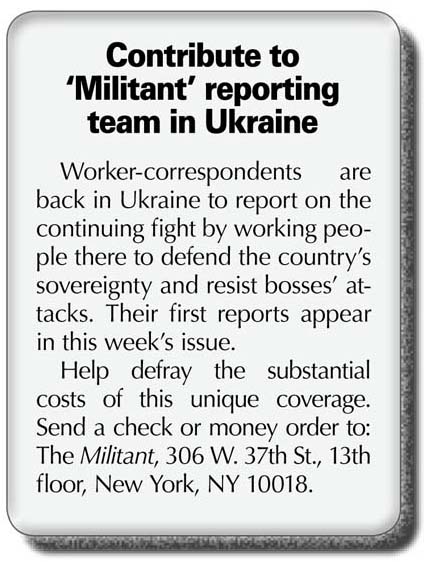

Vol. 78/No. 24 June 23, 2014

|
| Militant/John Studer |
| “Ukrainians are more conscious, more self-confident” as a result of Maidan protests that ousted President Yanukovych in February, Sergey Akamovych, an official of Chernobyl nuclear workers’ union, said June 8 in Slavutych at 26th anniversary celebration of town’s founding. |
The reason for the raised spirits “is the big events in the Maidan,” Akamovych said, referring to mobilizations that ousted the unpopular regime of Ukrainian President Viktor Yanukovych in February. “Ukrainians are more conscious, more self-confident.”
“They need to be,” he said, pointing to the attacks and provocations in the eastern provinces of Donetsk and Luhansk by paramilitary gangs entering from Russia to undermine Ukrainian sovereignty and destabilize the country.
“The town where we lived before, Pripyat, was uninhabitable because of the radiation,” said Viktoria Babek, vice chair of the union. “After Chernobyl, people came from all over the former Soviet Union. They built Slavutych and joined in efforts to clean up the area after the disaster.”
“There are people from 49 different nationalities here, from Russia, Donetsk, Lviv, all over Ukraine,” Akamovych said. “By challenging our country, [Russian President Vladimir] Putin has brought us together in defense of Ukraine. Things won’t ever be the same.”
When Militant correspondents returned to Kiev that evening, Mikhailo Volynets, president of both the Confederation of Free Trade Unions and the Independent Trade Union of Coal Miners of Ukraine, described the impact of the separatist provocations.
“Miners and other workers are losing their workplaces,” he said. “Miners have been kidnapped and tortured.
“Yesterday, Moscow-backed armed mercenaries invaded the Skochinsky mine in Donetsk,” Volynets said. “They tied up the mine director and beat him in front of the miners, threatening them with worse unless they closed the mine. Miners in the east overwhelmingly oppose these attacks, but even though they far outnumber the thugs, they cannot match their heavy weaponry.
“I oppose the austerity measures the International Monetary Fund is pushing on Ukraine,” he said. “The government wants to slash social benefits and says it will try and sell 38 of the 100 state-owned mines.”
The IMF, the European Union, Ukrainian capitalists and new Ukrainian President Petro Poroshenko are pushing to slash government benefits, reduce gas and electricity subsidies and make business more profitable on the backs of working people.
Russia is still Ukraine’s single biggest trading partner and supplies much of the country’s energy. In March, Russian state-owned Gazprom raised the price of gas to Ukraine by 80 percent and is demanding Ukraine pay more than $4 billion in supposed debts for fuel.
Moscow has its own problems, including an economy dependent on energy exports at a time when prices are declining. The vast majority of Russian capitalists, concerned foremost with political stability and foreign relations that maximize profits, don’t want war. And neither do most workers, tired of more than a decade of combat in Chechnya, Afghanistan and Georgia.
Moscow pulls back from threat to intervene
The Russian government has backed off from its threats of direct military intervention and withdrawn troops from the Ukrainian border. Putin has recognized the election of Poroshenko and as part of recent negotiations has offered to reduce the price of gas.Meanwhile, the heterogeneous separatist forces in eastern Ukraine are dividing. Separatist strongholds are increasingly being taken over by units calling themselves the Vostok Battalion, apparently made up of mercenaries tacitly backed by Moscow from Chechnya, Ossetia and other areas.
Near midnight June 8, camouflaged gunmen broke into the house of Vasyl Serdyukov, editor of Serditaya Gazeta, a newspaper that supports Ukrainian sovereignty, took him and his son for several hours and ransacked his home and office.
Residents in Donetsk reported June 10 that Oleg Zhelnakov, who is active in pro-Ukrainian demonstrations, was detained by separatist thugs and beaten.
Some 20,000 people have fled the region since April, according to the London Financial Times, most heading west to Dnepropetrovsk, Kiev and other cities, and some to the south or to relatives in Russia. Thousands of Crimean Tatars have also fled increasingly repressive conditions in their native homeland since its annexation by Moscow in March.
“Many arrive in Kiev almost every day now,” Sergey Shevchuk, a participant in the protests in the capital that brought down the Yanukovych regime, told the Militant June 9. “These are workers, bringing children and carrying almost no money.” He is one of a number of volunteers working to find them housing and financial aid.
Shevchuk says he has been transformed by the struggles of the past few months and remains committed to defend Ukraine’s sovereignty.

|